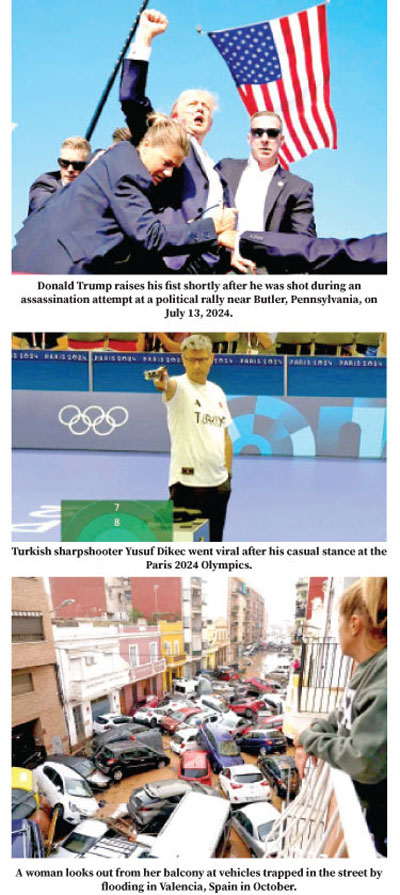 From ground-breaking advancements in Artificial Intelligence (AI) to democratic upends, 2024 has been a transformative year. Political realignments, economic challenges and new global conflicts have reshaped the world order, setting the stage for a complicated 2025.
From ground-breaking advancements in Artificial Intelligence (AI) to democratic upends, 2024 has been a transformative year. Political realignments, economic challenges and new global conflicts have reshaped the world order, setting the stage for a complicated 2025.
This year marked a monumental shift in Sri Lanka’s political landscape. President Anura Kumara Dissanayake won the public’s mandate, securing 55 percent of the vote in September. His victory marked the first time a third-party candidate being elected President.
 Come November, the Parliamentary polls caused further setbacks to seven-decades of UNP-SLFP dominated politics. The centre-left NPP, led by the JVP, won stronghold after stronghold including the indomitable Northern and Eastern electorates, with the exception of Batticaloa. Pundits said the reorganisation of the political map was an end to communal politics and the beginning of a unified national identity playing a larger role in Sri Lankan society.
Come November, the Parliamentary polls caused further setbacks to seven-decades of UNP-SLFP dominated politics. The centre-left NPP, led by the JVP, won stronghold after stronghold including the indomitable Northern and Eastern electorates, with the exception of Batticaloa. Pundits said the reorganisation of the political map was an end to communal politics and the beginning of a unified national identity playing a larger role in Sri Lankan society.
Greater accountability and transparency to eliminate decades of graft and corruption in governance were all on the ballot in this year’s elections.
As the polls clearly showed, the Sri Lankan public had grown alienated from traditional parties and the political elite which dominated for over 75 years. The demand for reforms in Government has gained momentum since the 2022 Aragalaya and the vast majority chose the NPP as a vehicle to exact that change.
Cynics on both the Left and Right disagreed that the NPP could overturn decades of rot ingrained in Sri Lanka’s political culture. While the Left accuses the NPP of compromising with the neoliberal establishment and abandoning socialism, the right says that the party’s ‘honeymoon’ with the public will be over soon given the harsh economic realities.
Stumbling blocks
However, the Government is not without a few stumbling blocks. The scandal over education qualifications of a few of its members including the Speaker is one example. The Speaker’s swift resignation, after his supposed doctorate was brought to light, has been lauded by constituents who said it shows the NPP Government’s commitment to transparency while others decry it as political shenanigans.
The challenges posed by Toque Macaques and the fluctuating availability of rice have tested the resilience of the newly-formed Government. While the Sri Lankan public has shown an increasing degree of self-awareness, recognising that complex issues need time and steady effort to resolve, the political rhetoric often fails to reflect this reality. Instead, fiery speeches and empty promises continue to dominate the stage, doing little to address the frustrations of a populace craving meaningful action and transparency.
 2024 has been dubbed ‘The Year of Elections’: more than 100 countries around four billion voters – approximately half of the world’s population – were eligible to vote in elections this year, including eight of the world’s 10 most populous nations – Bangladesh, Brazil, India, Indonesia, Mexico, Pakistan, Russia, and the United States; in addition, the EU held elections for the European Parliament in June.
2024 has been dubbed ‘The Year of Elections’: more than 100 countries around four billion voters – approximately half of the world’s population – were eligible to vote in elections this year, including eight of the world’s 10 most populous nations – Bangladesh, Brazil, India, Indonesia, Mexico, Pakistan, Russia, and the United States; in addition, the EU held elections for the European Parliament in June.
The U.S. Presidential election gained the largest media attention as President-elect Donald Trump secured a second term in office; bouncing back from his 2020 loss by winning the Electoral College and all swing states, in addition to the popular vote. The second Trump Presidency is expected to make significant changes to America’s foreign policy – especially regarding de-escalating ongoing conflicts in the Middle East and the war between Ukraine and Russia. Trump also pledged to raise tariffs on imports to stimulate U.S. domestic production, which will send huge ripples in the global economy.
Sri Lanka’s economy is getting back on track after facing its worst crisis since independence, marking a major milestone in 2024 by successfully completing its international bond restructuring, a critical step toward financial recovery following its 2022 debt default. The deal involved exchanging USD 12.5 billion in defaulted bonds and back interest for new GDP- and governance-linked instruments, with debt service payments reduced by USD 9.5 billion over four years under an IMF-backed plan.
The agreement, achieved after two years of negotiations, reduced the net present value of bonds by 40.3 percent and secured debt relief of USD 17 billion. Creditors, including global players such as BlackRock and Amundi, supported the plan, overcoming initial scepticism. China also backed equal treatment for all creditors.
President Dissanayake and Treasury Secretary Mahinda Siriwardana hailed the deal as a turning point, emphasising its role in restoring economic stability. With lower bond coupon rates, extended maturities, and governance reforms, the restructuring promises significant fiscal relief and economic recovery.
This December, international credit ratings agency Moody’s raised Sri Lanka’s long-term foreign currency issuer rating to ‘Caa1’ from ‘Ca’ with a stable outlook, after creditors approved the USD 12.55 billion debt overhaul.
On December 21, Fitch Rating upgraded Sri Lanka’s Long-Term Foreign-Currency Issuer Default Rating to ‘CCC+’ from Restricted Default.
With the new administration’s anti-corruption agenda, markets are responding positively- reflecting renewed investor confidence and optimism for future growth.
The year was also shaken by political upheavals and escalating conflict.
Freedom fighters
The Bangladesh quota reform movement began as a student-led protest against the country’s Supreme Court’s reinstatement of a 30 percent job quota for descendants of freedom fighters, which students said limited merit-based opportunities. The protests rapidly evolved into a nationwide uprising fuelled by public anger over Government corruption, human rights abuses and economic mismanagement.
 The Government’s violent response, including the deployment of armed forces, a shoot-at-sight curfew, and an internet blackout, exacerbated tensions. Hundreds were killed, thousands injured, and mass arrests followed, sparking global condemnation. Protesters expanded their demands to include accountability for violence, a ban on the ruling party’s student wing, and the resignation of Prime Minister Sheikh Hasina.
The Government’s violent response, including the deployment of armed forces, a shoot-at-sight curfew, and an internet blackout, exacerbated tensions. Hundreds were killed, thousands injured, and mass arrests followed, sparking global condemnation. Protesters expanded their demands to include accountability for violence, a ban on the ruling party’s student wing, and the resignation of Prime Minister Sheikh Hasina.
The crackdown transformed the movement into a broader, people-led non-cooperation campaign, symbolising widespread resistance against authoritarian rule.
The Bangladeshi uprising has been compared to the 2022 aragalaya.
On December 8, 2024, the Assad regime collapsed during a major opposition offensive led by Hay’at Tahrir al-Sham (HTS) and the Turkish-backed Syrian National Army. The capture of Damascus ended the Assad family’s five-decade rule, which began with Hafez-al-Assad’s 1971 coup. Bashar -al-Assad fled to Russia, joining his exiled family, and was granted asylum.
The regime’s rapid fall shocked observers and dealt a severe blow to Iran’s regional influence, particularly its supply routes to Hezbollah. Opposition forces declared victory, marking a pivotal moment in the ongoing Syrian civil war.
We also saw the Israel-Hamas war escalate into a broader conflict this year with Israel’s invasion of southern Lebanon to combat Hezbollah forces and Houthi’s targeting global shipping through the Red Sea in solidarity with the Palestinians. More than 45,000 people have been killed in the Gaza strip as human rights groups and the UN have declared a humanitarian crisis as a result of the Israel-Hamas war.
Both sides have blamed each other for violating the ceasefire. On December 1, the truce ended with Hamas alleging that Israel rejected a hostage exchange deal to prolong the truce, and Hamas then launched rockets into Sderot.
Israel responded with air raids on Gaza with the Gaza Health Ministry reporting 20 deaths.
There has been a surge of anti-Semitism around the world, due to the Israel-Hamas war. This year was rife with news reports of vandalised synagogues and Jews being assaulted and even killed.
In November 2024, Chabad rabbi Zvi Kogan was found murdered in Al Ain, UAE. Emirati officials said he was abducted by three Uzbek nationals who fled to Turkey, where authorities apprehended and extradited them to the UAE. Also in November, a terror plot targeting Israelis in Arugam bay was thwarted by Sri Lankan authorities thanks to reports by Indian intelligence agencies.
Record-breaking temperatures
The year was disastrous for the environment. 2024 is set to be the hottest on record – the first six months had record-breaking temperatures, extending the streak that started in 2023 to 13 months, with the world’s hottest day in history recorded on July 22.
In Sri Lanka, environmentalists said that the climate crisis is escalating the human-elephant conflict and poor harvests. Scientists are setting off alarm bells as conditions worsen year-on-year.
The most shocking studies this year found microplastics in human bodies including our bloodstream, brain and reproductive organs. But it was not all panic when it comes to plastics in 2024; scientists at RIKEN developed a strong plastic that breaks down in seawater, avoiding microplastic pollution.
Speaking of scientific developments, Artificial Intelligence took front and centre in headlines this year. In 2024, AI innovation mainly centred around chatbots, with capabilities such as voice cloning, image generation, transcribing, music-making and realistic video-generation.
As the media, we are trying our best to strike a balance with the new technology. The press is being accused of using ChatGPT but who can really point a finger at this point? As a matter of fact, we might just be seeing glimpses of a future where many jobs will be automated. Roles involving rule-based, repetitive tasks or ones where interaction is primarily standardised will be replaced by AI. Jobs that are most likely to be automated by 2030 include cashiers, telemarketers, data entry clerks, and customer service agents.
2024 was a year of profound change—it showcased humanity’s resilience, innovation, and the challenges ahead. It highlighted the need for accountable governance, sustainable practices, and ethical technological integration to navigate an increasingly complex world.




